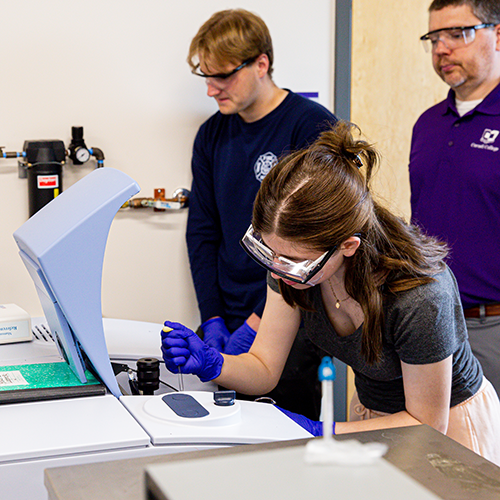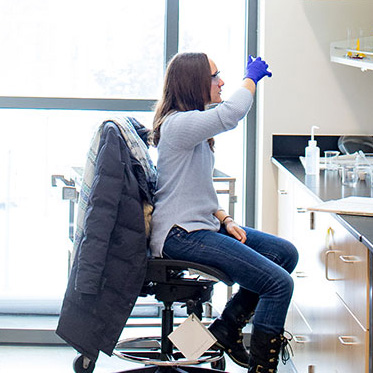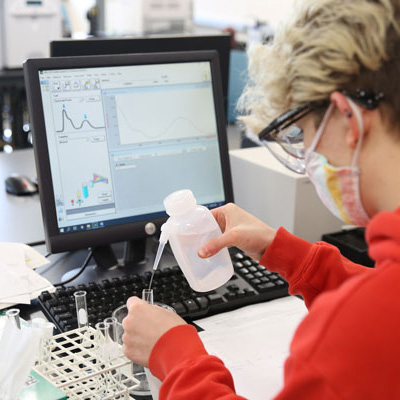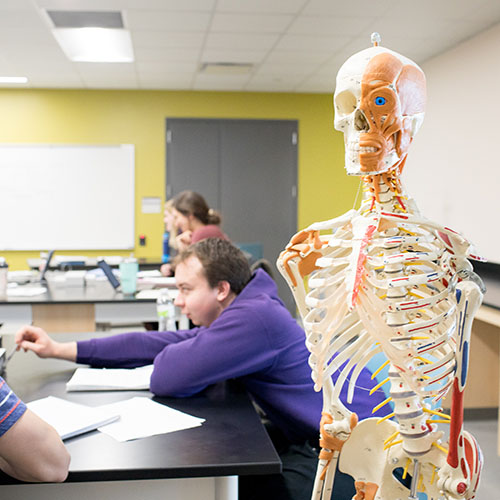Biochemistry and Molecular Biology Degree Program
Why major in biochemistry and molecular biology at Cornell College?
Our interdisciplinary program in biochemistry and molecular biology (BMB) is designed to prepare you well for graduate school, professional school, or a technical career in the field.
Want to completely immerse yourself in scientific discovery? Step into our 45,600-square-foot Russell Science Center that was built with Cornell’s block plan, One Course At A Time, in mind. You will have access to dedicated STEM spaces, chemistry and biology labs, classrooms dedicated to your class, research rooms, and study areas.
One Course At A Time gives you the opportunity to truly focus without the distractions of other classes. In the lab, you’ll have the time you need to conduct more complex and in-depth investigations. And you’ll have the opportunity to take advantage of research experiences beyond our campus.
Your education will set you up for success that can lead to research positions, graduate level health care programs, and future careers in environmental sustainability.
Cornell Summer Research Institute: batteries to power the future
Cornell faculty and summer research students worked as part of a multi-campus study of what might be the next generation of batteries to replace today’s lithium-ion batteries, which require materials primarily mined outside of the United States. This group of researchers is studying redox flow batteries.
Student researchers Jewell and Markegard are interested in working in healthcare careers. They’re learning vital skills in the lab and lending a hand in making a difference for our planet.
BMB course and degree requirements

With our Ingenuity Curriculum, you will gain the critical thinking skills that will provide you with a solid academic foundation as you work toward your degree.
Using the tools you’ve acquired, you will be immersed in a biochemistry and molecular biology curriculum that you’ll find both challenging and rewarding. In your courses, you will learn at the interface of biology and chemistry and explore how each discipline influences the other. You’ll dive into different topics—atoms, genes, enzymes, cellular pathways, and organic synthesis.
Biochemistry and molecular biology capstone
You’ll put an exclamation point on your education by conducting an independent capstone research project. You can create your own study or take on a problem covered in an off-campus trip. You will review literature, collect and interpret data, and write a research report. Learn more about the biochemistry and molecular biology degree requirements by exploring our course catalog.

Opportunities for undergraduate research in BMB
Interested in going on a diving expedition in the Caribbean to study coral bleaching? Want to conduct research with doctors at a prestigious urban medical center? You’ll have the opportunity to gain hands-on experience in your field.
Cornellians have recently completed research internships at Baylor College of Medicine in Houston, Texas; the Children’s Hospital in Aurora, Colorado; and the University of Maryland School of Medicine in Baltimore, Maryland. Each summer we follow students sharing their work through our student internship blogs.
Back home on the Hilltop, our faculty will gladly take you under their wings and involve you in collaborative research projects on a diverse range of topics as a part of the Cornell Summer Research Institute or academic year research.
What are Cornell students doing in internships? Check out their blogs.
Internships in Health & Wellness Internships in Science & Research

Career opportunities in biochemistry and molecular biology
BMB Majors often continue their education into health professions and biological research fields. While you’re at Cornell, you’ll find that the Dimensions Program for Health Professions and The Berry Career Institute can help you identify what you’ll pursue with your knowledge of biological systems.
Delving into antibiotic resistance
What can society do to counter the super bugs that are resistant to the antibiotics we count on to keep us healthy? One group of CSRI students tackled these questions in their summer research project.

